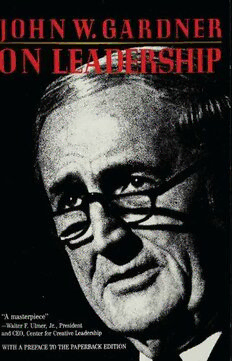Table Of Content7 GARDNER
&y„
Sf
“*• >.v.'
■ Hi
ill
f l l i
« 11»
-anastm. 9
18 **Si
W m
p',;
/i
# 1
“A masterpiece ^
—Walter F. Ulmer, Jr., President
and CEO, Center for Creative Leadership
WITH A PREFACE TO THE PAPERBACK EDITION
J
JOHN W. GARDNER
ON LEADERSHIP
JOHN W. GARDNER attended Stanford University (A.B., 1935; M.A., 1936)
and the University of California (Ph.D., 1938). He taught psychology at the
University of California, Connecticut College and Mount Holyoke College. He
was an officer in the U.S. Marine Corps in World War II.
He was president of the Carnegie Corporation and the Carnegie Foundation
for the Advancement of Teaching (1955-1965); U.S. Secretary of Health,
Education, and Welfare (1965-1968); chairman of the National Urban Coalition
(1968-1970); founding chairman of Common Cause (1970-1977); and a co
founder of Independent Sector (1980). Mr. Gardner served on President
Kennedy’s Task Force on Education and was chairman of President Kennedy’s
Commission on International Educational and Cultural Affairs. He was chair
man of President Johnson’s Task Force on Education, served on President
Carter’s Commission on an Agenda for the ’80s, and chaired (1976-1980) the
President’s Commission on White House Fellowships. He served on President
Reagan’s Task Force on Private Sector Initiatives.
Mr. Gardner has been a director of a number of corporations, including
Shell Oil Company, the New York Telephone Company, American Airlines and
Time, Inc. Among other organizations he has served as a board member are
Stanford University and the Scientific Advisory Board of the Air Force.
Mr. Gardner was the editor of President John F. Kennedy’s book To Turn
the Tide and the author of Excellence, Self-Renewal, No Easy Victories, The
Recovery of Confidence, In Common Cause and Morale. He is the coeditor, with
Francesca Gardner Reese, of Quotations of Wit and Wisdom.
In 1964 Mr. Gardner was awarded the Presidential Medal of Freedom, the
highest civil honor in the United States. Among other awards he has received are
the U.S. Air Force Exceptional Service Award, and the Distinguished Achieve
ment Medal of the Stanford Athletic Board.
John W. Gardner
ON LEADERSHIP
WITH A PREFACE TO THE
PAPERBACK EDITION
THE FREE PRESS
Copyright © 1990 by John W. Gardner
All rights reserved. No part of this book may be reproduced or transmitted in any form or by
any means, electronic or mechanical, including photocopying, recording, or by any informa
tion storage and retrieval system, without permission in writing from the Publisher.
The Free Press
A Division of Simon & Schuster Inc.
1230 Avenue of the Americas
New York, N.Y. 10020
First Free Press Paperback Edition 1993
Printed in the United States of America
printing number
11 13 15 17 19 20 18 16 14 12
Library of Congress Cataloging-in-Publication Data
Gardner, John William
On Leadership/John W. Gardner
p. cm.
Includes bibliographical references.
ISBN 0-02-911312-1
1. Political leadership. I. Title.
JC330.3.G37 1990
303.3'4 —dc20 89-16894
Brian O’Connell
Digitized by the Internet Archive
in 2011
http://www.archive.org/details/onleadershipOOjohn
CONTENTS
Preface to the Paperback Edition ix
Acknowledgments xiii
Introduction xv
1. The Nature of Leadership 1
2. The Tasks of Leadership 11
3. The Heart of the Matter: Leader-Constituent Interaction 23
4. Contexts 38
5. Attributes 48
6. Power 55
7. The Moral Dimension 67
8. Large-Scale Organized Systems 81
9. Fragmentation and the Common Good 93
10. The Knitting Together 101
11. Community 112
12. Renewing 121
13. Sharing Leadership Tasks 138
14. Leadership Development: The Early Years 157
15. Leadership Development: Lifelong Growth 171
16. Motivating 183
17. The Release of Human Possibilities 193
Notes 201
Index 211
vii
Preface
to the Paperback Edition
I made the point in the hardcover edition three years ago that most
leaders today accomplish their purposes through (or in spite of) large-
scale organized systems. And I suggested that such systems simply can
not function effectively unless leaders are dispersed throughout all seg
ments and down through all levels. There must be—in every segment
and at every level—individuals capable of taking leader-like action to
make their piece of the system work, individuals prepared to accommo
date system-wide policy to ground-level realities, men and women who
are not afraid to send word back up the line that newly-announced
policies need amendment or reversal.
The good news is that recognition of this reality has progressed
rapidly in the corporate world, and is beginning to penetrate the world
of government. Even more encouraging, leaders from the various seg
ments of our national life—business, government, the professions,
labor and the nonprofit world—are coming to recognize that they need
one another and to collaborate in imaginative ways.
Great things happen nationally when topmost leadership is goaded
and supported from below. It is impossible to imagine that our present
extensive environmental legislation could have been put in place
through the initiative of the Executive Branch and Congress acting
alone. Governmental leaders were responding to a dynamic movement
outside of government. The same can be said for the great civil rights
ix

